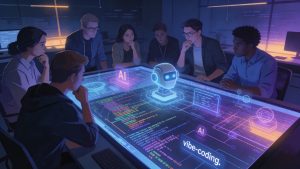A remarkable transformation is underway in the world of software creation. In workplaces embracing AI-assisted development, roles once considered “non-technical” are now topping engineering leaderboards, shipping features, and prototyping solutions at unprecedented speed. This shift is not a futuristic fantasy—it’s a reality unfolding in organizations that have integrated AI into their development workflows.
AI is not just changing how code is written; it is redefining who gets to participate in building technology. The emergence of AI-powered coding tools is democratizing software development, inviting professionals from every background to contribute meaningfully, regardless of their previous technical experience.
Who Benefits from AI-Assisted Coding?
Software and AI Engineers
For those deeply embedded in software, machine learning, or AI engineering, AI-assisted coding eliminates tedious setup and dependency management. This allows engineers to focus on solving complex, meaningful problems and finally tackle those side projects that have been waiting for attention. With AI handling repetitive tasks, developers can spend more time innovating and less time on maintenance.
Senior and Principal Engineers
Veteran engineers who have built their careers on strategic thinking and risk management find their influence amplified. AI tools free them from routine implementation, enabling them to orchestrate teams and technology with greater agility. These professionals can now drive multiple projects forward, leveraging both human and AI resources to achieve ambitious goals.
Technology Leaders
Executives and managers who once enjoyed hands-on coding can now reclaim that experience. AI-assisted development allows them to prototype ideas during meetings and refine concepts directly, providing firsthand insight into how modern tools are transforming workflows. This renewed engagement sharpens strategic judgment and uncovers new opportunities for innovation.
Returning Professionals
Many talented individuals left coding behind due to the overwhelming complexity of modern development environments. AI now removes these barriers, automating environment setup and handling intricate technical details. This enables professionals to return to programming, deliver impactful projects, and avoid the frustrations that once drove them away.
Product Owners and UX Specialists
Those with foundational programming knowledge—such as product owners and UX designers—can now bring their ideas to life without waiting for engineering resources. AI-assisted coding empowers them to build features or prototypes independently, accelerating product development and demonstrating the feasibility of concepts previously considered too complex.
Infrastructure Engineers
Infrastructure specialists, including DBAs, SREs, and cloud engineers, are no longer limited by the traditional divide between application development and infrastructure. With AI, they can build sophisticated tools tailored to their unique needs—such as monitoring systems, migration utilities, or auto-scaling solutions—without mastering every new language or framework.
Veteran Developers
For experienced programmers who stepped away due to the mounting hassles of modern tooling, AI is providing a compelling reason to return. The technology now handles much of the complexity that once made development frustrating, enabling these “level 99 heroes” to showcase their expertise and mentor the next generation.
Students and Early-Career Professionals
Aspiring developers are entering the workforce at a pivotal time. As AI becomes integral to every software role, students who master AI collaboration will stand out. Rather than focusing solely on syntax and frameworks, the new priority is learning how to work alongside AI to build and refine software efficiently. This shift enables students to deliver impressive projects and develop expertise that will be invaluable throughout their careers.
Tech-Adjacent Roles
Professionals in roles such as program management, analysis, QA, customer success, sales, finance, HR, and marketing often have workflows ripe for automation. AI-assisted coding allows them to optimize processes and implement improvements directly, bypassing long waits for developer support. This not only increases organizational efficiency but also earns appreciation from engineering teams.
A New Era of Inclusive, Productive, and Enjoyable Coding
AI-assisted development is making programming more accessible and enjoyable for everyone. By handling the technical heavy lifting, AI enables individuals to focus on solving real problems and bringing creative ideas to life. Whether someone is returning to code after years away, building their first project, or seeking to automate business processes, AI is the catalyst for a new era of universal participation in software creation.
This transformation is not just about productivity—it’s about empowering people to rediscover the joy of building, collaborating, and innovating with code. The barriers that once kept many out of programming are falling, and the world is witnessing a great comeback as professionals from every field log back in, ready to shape the future with the help of AI.
Read more such articles from our Newsletter here.



